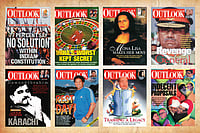A travelogue with a difference, this. One that illuminates history, offers fresh perspective, pares the onion that is a place to reveal its quintessence. In the process, of course, it tells us very human stories that make us smile, laugh out loud and sometimes get jolted. Hard. At other times it evokes poetry that makes the heart sing.
Hariharan, a Palghat Tamil brought up in Mumbai, Manila, resident variously of Chennai, Bangalore, New York and now a Delhi denizen, wonders aloud how to respond to the classic opening line of any Indian conversation “ ... What is your ‘native’ place?”! A complex question that doesn’t admit a pat response. There’s a part of everywhere within us all: wherever we’ve lived impacts us, claims us, even as it belongs to us. We’re all residents, at least in our heads, of the anycity Hariharan fantasises about—here there’s everything we loved about any place we’ve ever passed through: Mumbai’s sea, Delhi’s greens, New York’s palpable buzz, Japan’s oft meditative stillness....
But back to the travelogue. Hariharan travels us through Mumbai, Ooty, Hampi, Srinagar, Edo aka Tokyo, Cordoba, Algeria, Copenhagen, Palestine, New York, Washington, Delhi and yes, Gergen aka our very own Gurgaon! The subcutaneous is laid bare, the subtext revealed, the people in the picture postcard made real: Their joys, tragedies, conundrums, beauty, ugliness, peccadillos, poetry.
Hariharan cameos the real people leading real lives behind the picture-postcard images purveyed as palatable substitute. Delhi is not leafy Lutyens. Rather, it’s feisty slum girls Sonya, Puja and Naseem’s shanty town Kusumpur off tony Vasant Vihar; Mumbai is not the Gothic Victoria Terminus, but the sordid politics behind its rechristening, or the commuter awaiting a train at a platform, carrying a searing second memory of the atavistic 26/11 shootout. Not Dal, Nagin lake or Shalimar Gardens: Srinagar is about the dry-eyed grief of mothers desperately looking for ‘disappeared’ sons and ‘half widows’ looking for emotional closure. Algeria is testament to French duplicity: extolling liberty, equality, fraternity at home, while morally justifying oppression on ‘others’ as ‘unfortunate necessity’ abroad. Algeria is also a country betrayed by its own, its people “waiting for the nation” they thought they were fighting for. Faiz comes to mind: “Tha jo intezar jiska/yeh woh subah to nahin”.
Hariharan portrays the tragedy of Palestine: a people, a past, a history obliterated by Machiavellian Big Power design. Circa 1857, the British counsel records, “This is a country considerably empty of inhabitants” and that its “greatest need is of a body of population”. Fast forward to Golda Meir in the mid-20th century saying, “There are no Palestinians”! The poetry of Darwish, the sad tale of Muneer and others of his ilk bring home the entire magnitude of Palestine’s tragedy.
Japan and its technicolor frenzy does not register with Hariharan. It is Japan’s essential spirit she communicates to us, with Basho’s haikus; the mode of expression that distils the world to its essence. The writer in her realises the vitality of the ‘homegrown voice’ that no amount of literary smarts can hold a candle to. Like simple medieval Basho: Summer grasses/all that remains/of soldiers dreams.
This gem of a book is worth having if only for the priceless anecdote about Imelda Marcos hosting a beef/chicken/fish lunch for poor M.S. Subbulakshmi, then gifting her a box of cigars as a takeaway!


























